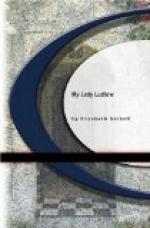“Jacques covered his eyes, blinded with tears. The report of a pistol made him look up. She was gone—another victim in her place—and where there had been a little stir in the crowd not five minutes before, some men were carrying off a dead body. A man had shot himself, they said. Pierre told me who that man was.”
CHAPTER IX.
After a pause, I ventured to ask what became of Madame de Crequy, Clement’s mother.
“She never made any inquiry about him,” said my lady. “She must have known that he was dead; though how, we never could tell. Medlicott remembered afterwards that it was about, if not on—Medlicott to this day declares that it was on the very Monday, June the nineteenth, when her son was executed, that Madame de Crequy left off her rouge and took to her bed, as one bereaved and hopeless. It certainly was about that time; and Medlicott—who was deeply impressed by that dream of Madame de Crequy’s (the relation of which I told you had had such an effect on my lord), in which she had seen the figure of Virginie—as the only light object amid much surrounding darkness as of night, smiling and beckoning Clement on—on—till at length the bright phantom stopped, motionless, and Madame de Crequy’s eyes began to penetrate the murky darkness, and to see closing around her the gloomy dripping walls which she had once seen and never forgotten—the walls of the vault of the chapel of the De Crequys in Saint Germain l’Auxerrois; and there the two last of the Crequys laid them down among their forefathers, and Madame de Crequy had wakened to the sound of the great door, which led to the open air, being locked upon her—I say Medlicott, who was predisposed by this dream to look out for the supernatural, always declared that Madame de Crequy was made conscious in some mysterious way, of her son’s death, on the very day and hour when it occurred, and that after that she had no more anxiety, but was only conscious of a kind of stupefying despair.”
“And what became of her, my lady?” I again asked.
“What could become of her?” replied Lady Ludlow. “She never could be induced to rise again, though she lived more than a year after her son’s departure. She kept her bed; her room darkened, her face turned towards the wall, whenever any one besides Medlicott was in the room. She hardly ever spoke, and would have died of starvation but for Medlicott’s tender care, in putting a morsel to her lips every now and then, feeding her, in fact, just as an old bird feeds her young ones. In the height of summer my lord and I left London. We would fain have taken her with us into Scotland, but the doctor (we had the old doctor from Leicester Square) forbade her removal; and this time he gave such good reasons against it that I acquiesced. Medlicott and a maid were left with her. Every care was taken of her. She survived till our return. Indeed, I thought she was in much the




